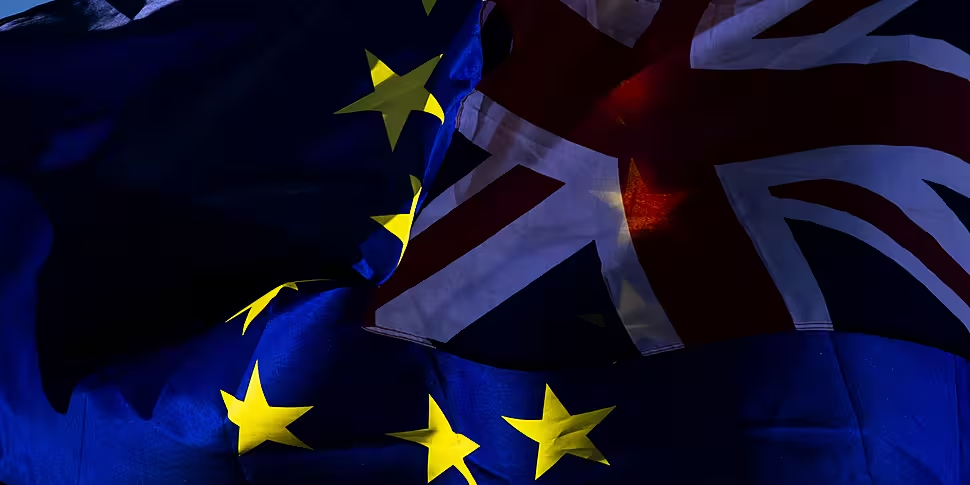Minister of State for European Affairs Thomas Byrne has said even if there is a trade deal between the European Union and United Kingdom on January 1st, Ireland still faces 'huge differences, inconveniences and problems'.
It comes as European Commission President Ursula von der Leyen and British Prime Minister Boris Johnson said their chief negotiators will meet on Sunday as 'significant differences remain' in several key areas.
The EU's chief negotiator Michel Barnier said on Friday that talks were paused after "significant divergences" remain on the level playing field, governance and fisheries.
Minister Byrne earlier told Newstalk Breakfast with Susan Keogh the fact the talks are 'paused' is important.
"The talks are paused - which I think is crucial - they're not ended.
"The process is still ongoing, and if you were to plan a scenario for these types of negotiations earlier on in the year you may well have said that such an event would happen".
"This is not unusual, it's not unexpected - having said that though, the differences between the negotiating teams are definitely real - this is not some planned choreography."
"But we continue to believe - and there's no doubt - that a deal is in the best interests of us, the UK and we believe the wider European Union as well.
"We're very hopeful a deal can be reached, but time is running out - let there be no doubt about that".
'Substantial changes'
However he said regardless of what happens, there will be changes.
"No matter what happens in these talks - whether it's deal or no deal - Brexit results in substantial changes to the UK's relationship, and particularly Great Britain's, relationship to Ireland in terms of trade.
"There are going to be huge differences, huge inconveniences and huge problems after the 1st of January even if we have a deal."
Minister Byrne said he hoped a deal would mean that there would be no tariffs on trading goods, "but there will still be customs checks, there will still be items you won't be able to import from Britain or items that we won't be able to export".
But he said there is no doubt that a trade deal "will generally have a better atmosphere that issues can be resolved if we do that".
And Minister Byrne said that no deal "isn't really an option" - as that would be "an absolute disaster".
"It would certainly be very damaging for Ireland, it would be highly damaging to the UK - it would put COVID in the shade in terms of its impact on the British economy."
"I have no doubt that Boris Johnson, while looking at a lot of difficult issues - I think the alternative that he would just walk away and not have a trade deal with his nearest neighbour I think just would create so much economic damage in the new year that he's just going to have to take on and lead this through".
'Limits of his mandate'
Shona Murray is Europe correspondent with Euronews.
She said if there is a no deal in place on December 31st, both sides may have to come back to the table in January.
"I think they really, here in Brussels, would have expected or wanted both sides to have a political intervention a couple of weeks ago, so it's kind of about time.
"Michel Barnier as a negotiator has reached pretty much the limits of his mandate - and that requires now a political intervention."
She said this is particularly the case from British Prime Minister Johnson "to decide whether he wants the deal or not".
"There's very little meat left on the bone to negotiate - although specifically on fishing, they're still very far apart as to what looks like a fair deal."
But she said any deal would still need to be sold to hard-line Brexiteers in Britain's Conservative Party.
"Really there's a feeling now in Brussels that Boris Johnson needs to decide if he's going to secure a deal and try to sell it - particularly to the hard-liners in the ERG, and also the huge new crop of Brexiteers that joined the Conservative Party and that are now MPs in the House of Commons".
"A lot of them won't like this deal, no matter how thin it is, because any deal with the EU will require a level playing field, will require common standards on labour laws and environment.
"And for Brexiteers that might be too much to take".
'No deal isn't an option'
She said hopes are now pinned on these talks.
"This is really down to [Boris Johnson's] political decision-making".
"Could he say - for example - that he could walk away with no deal, blame it on EU intransigence, blame it on COVID - or try to sell a deal which no matter what won't satisfy everyone".
Shona said the clock is ticking towards the end of the transition period on December 31st.
"The timeline for a deal to be done really has to be Monday: the parliament and the member states need to ratify it and it has to be in place by the 1st of January".
And she added that if there is a no deal, talks will have to continue into January.
"No deal really isn't an option here: no matter what, it's not sustainable for the EU and the UK not to have a trade agreement.
"The biggest free trade market in the world - the EU - and the fifth largest economy in the world, living side by side, each other totally interdependent.
"If they say 'no deal', then they'll have to come back to the table in January - it'll be even more difficult, even more acrimonious and you'll see a colossal amount of damage already done in trade".









